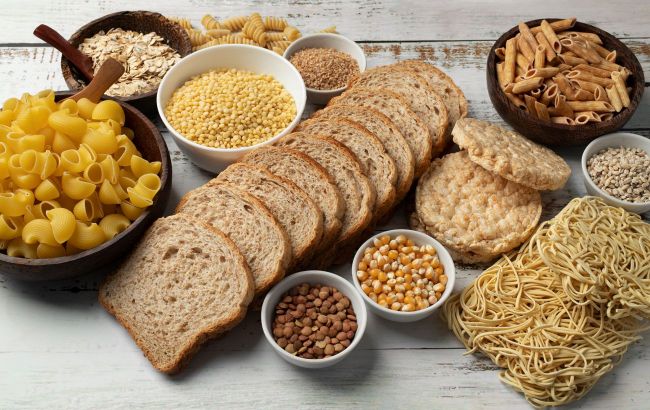Why body needs carbohydrates: How much you can eat for weight loss and gain
 Photo: Why the body needs carbohydrates (freepik.com)
Photo: Why the body needs carbohydrates (freepik.com)
Carbohydrates are the main source of human energy. They are essential for the proper functioning of the body, according to Ukrainian coach Yurii Popko.
What is important to know about carbohydrates
The amount of carbohydrates in your daily diet can be up to 50% of your total calories, but this percentage can vary depending on your goal: losing weight, maintaining weight, or gaining weight. However, the ratio of protein, fat and carbohydrates is of secondary importance - the main role has the total caloric content of the diet.
Our ancestors consumed much less carbohydrates than we do now. Their diet consisted mainly of proteins and fats, because they ate what they could catch. Carbohydrates came from root vegetables, fruits, berries, and, if they were lucky, honey.
Carbohydrates play an important role in the regulation of protein and fat metabolism and are also involved in the synthesis of some enzymes and hormones. Most importantly, our brain is not powered by sugar, as many people believe, but by glucose, which comes from all types of carbohydrates.
Carbohydrates are divided into two main types: simple and complex. However, the body eventually converts them all to glucose, but at different rates. We use glucose as a source of energy, and its consumption depends on the level of physical activity. If we eat a lot of carbohydrates and move little, the excess is stored as glycogen, and if we eat a high-calorie diet, it is stored as fat.
Our body can store about 500-600 grams of glycogen, of which 100-120 grams are stored in the liver (7-10% of its weight) and 1-2% in the muscles. It is worth noting that 1 gram of glycogen can retain up to 4 grams of water in the body.
Why do we lose and get weight?
The math is simple: if you follow a high-protein, low-carbohydrate diet for a certain period of time, your glycogen stores are limited. And if you break your diet and eat sweets, your glycogen stores will quickly recover.
1 gram of glycogen retains 4 grams of water in the body. That is, 500 grams of glycogen is 2 kilograms of water, which can appear on the scales in the first days after a diet break. This does not mean that you have gained 2 kilograms of fat, as many may think.
What happens when your glycogen stores are full, but you continue to eat carbohydrates and exceed your daily caloric intake? In this case, the excess glucose begins to be stored as fat, because the glycogen reservoirs are full. This explains why excessive carbohydrate intake can lead to fat gain.
Regularly exceeding the consumption of sugar and other easily digestible carbohydrates can also contribute to the development of latent diabetes. This is due to an overload of the pancreas, which produces insulin to absorb glucose. Even if you don't consume too many calories, the excess of carbohydrates can negatively affect your health in the long run.
And what are the symptoms of a lack of carbohydrates? Here are a few of them:
- Constant fatigue due to lack of energy.
- Drowsiness.
- Digestive problems (carbohydrate fiber is important for the stomach).
- Impaired concentration.
- Constant hunger (it is difficult to stay on this diet for a long time).
- Anxiety.
- Difficulties in mental activity.
- Dizziness and other unpleasant sensations.
This material is for informational purposes only and should not be used for medical diagnosis or self-treatment. Our goal is to provide readers with accurate information about symptoms, causes, and methods of detecting diseases. RBС-Ukraine is not responsible for any diagnoses that readers may make based on materials from the resource. We do not recommend self-treatment and advise consulting a doctor in case of any health concerns.

